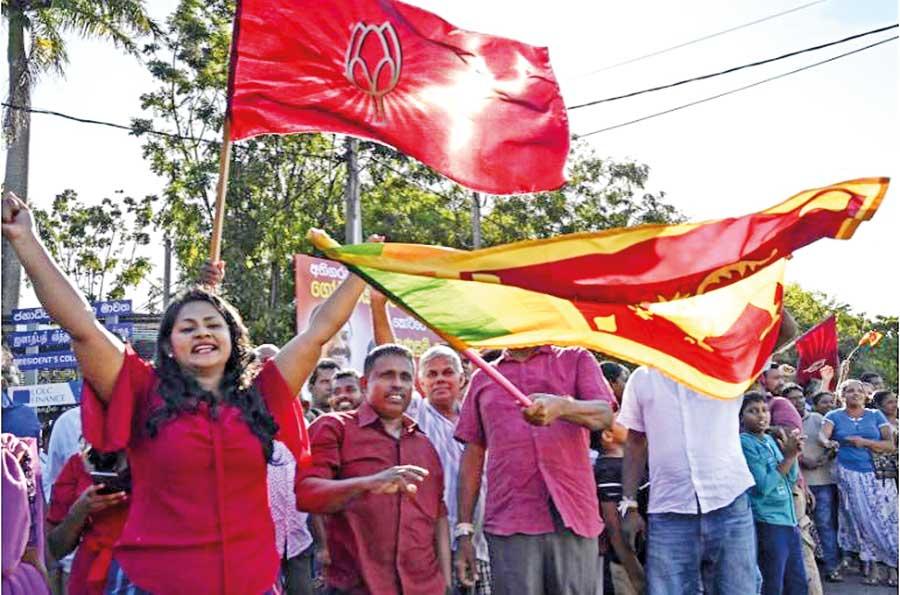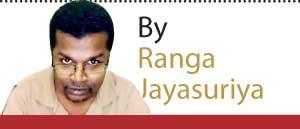16 Dec 2021 - {{hitsCtrl.values.hits}}

Supporters of Sri Lanka's President-elect Gotabaya Rajapaksa cheer near the Election Commission office in Colombo [S Kodikara/AFP]
Before the Covid-19 pandemic, Sri Lanka was infested by a pandemic of a different kind: An outbreak of borderline racism and boundless populist irrationality. The carriers and incubators of that pathogen are now the stakeholders of the current government. Then in the opposition, they spread a mass hysteria laced with racist dog-whistling, conspiracy theories and promises to fix it all through the pie in the sky economic policies and an exclusivit restructuring of the state at the expense of minorities. The large swathe of the constituency swallowed it hook, line and sinker.
of that pathogen are now the stakeholders of the current government. Then in the opposition, they spread a mass hysteria laced with racist dog-whistling, conspiracy theories and promises to fix it all through the pie in the sky economic policies and an exclusivit restructuring of the state at the expense of minorities. The large swathe of the constituency swallowed it hook, line and sinker.
Gotabaya Rajapaksa was elected the president in a landslide in November 2019 and Sri Lanka Podujana Peramuna (SLPP) swept to power with a near two-thirds majority in the house months later. They duly bought in a few pole-vaulters to secure the two-third majority and pass the 20th amendment, effectively dismantling the constitutional checks and balances set in the previous 19th amendment. With an all-powerful president, the spin-doctors predicted with a fawning delight that the country was all set for a great economic takeoff.
"The tragedy in Sri Lanka was that the populist irrationality that underpinned the election victories of the current government outlived the election. They came to define the government policy and unleashed destruction unseen in recent memory."
What happened instead was an unprecedented economic disaster. Temptation is to blame the Covid-19 pandemic for all the unravelling. The pandemic surely had its tool on the economy, but in the international comparison, Sri Lanka’s economic woes are exceptional and cannot be explained by the economic shock of the pandemic alone. After all, a few countries, such as Lebanon, have faced a certain bankruptcy, even then only in part due to pandemic shock, but more due to long term economic mismanagement. Yet a few countries have acted as incorrigibly as the leaders of the current government.
The tragedy in Sri Lanka was that the populist irrationality that underpinned the election victories of the current government outlived the election. They came to define the government policy and unleashed destruction unseen in recent memory.
While Sri Lanka’s debt crisis has been developing for over decades, a shortsighted decision, indeed an election pledge, to grant extensive tax exceptions effectively reduced the government revenue by 1.5% of the GDP. The number of registered taxpayers dropped by 33.5% from 2019 to 2020.
Having curtailed its tax base, the government also snubbed the IMF, from which its predecessor had obtained a bailout. For the next two years, the government ate into the foreign reserves to pay off the sovereign debt, effectively eroding the US $ 8 billion of foreign reserves when it took over the office to less than US$ 1.5 billion as of November this year. That is sufficient for less than one month of import. With around US$ 3.5 billion of debt and interest payments due next year, Sri Lanka is veritably bankrupt.
"While Sri Lanka’s debt crisis has been developing for over decades, a shortsighted decision, indeed an election pledge, to grant extensive tax exceptions effectively reduced the government revenue by 1.5% of the GDP. The number of registered taxpayers dropped by 33.5% from 2019 to 2020."
Instead of fixing the problem before it could lead to a complete economic collapse at home, the government has squandered each opportunity. An ego fuelled ignorance has procrastinated the crisis, bringing it to a point of no return. As the government is now sending contradictory signals about going to the IMF, much of the damage is already done.
The domestic economy is at the brink of collapse due to an acute dollar shortage and stiff import restrictions. The construction sector, which accounted for 7.2% of the GDP in 2019 and employed 600,000 is at its breaking point, faced with an acute shortage of building material.
The fallacy of a demagogic ban on chemical fertilizer is now all to see. The decision was meant to be a face-saving measure for the government›s inability to finance the fertilizer subsidy and was heralded as fulfilling another election promise of Gotabaya Rajapaksa. However, the unprecedented calamity it unleashed had no comparison. The skyrocketing vegetable prices, the usual consumer gripe, is not the most devastating of the outcome. The greatest tragedy of all was the hundreds of thousands of farming families who have been forced back into poverty. Notwithstanding the rhetoric of offering compensation, a cash strapped government is not in a position to do so, except through another binge of money printing which would increase inflation.
"An ego fuelled ignorance has procrastinated the crisis, bringing it to a point of no return. As the government is now sending contradictory signals about going to the IMF, much of the damage is already done."
So much for fostering exports, an unsustainable peg of Sri Lankan rupee against the US dollar (Rs. 203/US$) is effectively a 20% tax on the local exporters, and remittance by the migrant workers, the latter has halved in October for the second consecutive month against the corresponding month in 2019. The local importers are resorting to ad-hoc measures to overcome the exchange crisis. Daily explosions and fires related to cooking gas canisters are a dangerous fall out of these home remedies.
The worst affected of the government’s mishandling of the debt crisis is indeed the constituency that voted in both hands to elect Gotabaya Rajapaksa and the SLPP to power. Like many other populist leaders around the world, the president and the government have cannibalized their own support base.
Faced with a looming debt default and uncertain future, Sri Lanka is not in a position to attract credible investors. Notwithstanding the government blaming the pandemic for the low foreign direct investment, across the world, FDI inflows in 2021 exceeded the pre-pandemic level. According to OECD, the global investment flows rebounded to US$ 870 billion in the first half of 2021, a 43% increase from the corresponding period in 2019. Sri Lanka’s FDI inflows during the period are barely US$ 0.5 billion!
As the country enters 2022, it would also be the worst year in Sri Lankan history. Without a clear policy to solve its debt crisis, and vacillation about committing itself to a long term debt restructuring plan which would come with strings by the IMF, and a temptation to backtrack on such commitments at the first available opportunity, Sri Lanka is in an unenviable place. A disorganized debt default may happen at any time when the government runs out of its temporary fixes.
If not, with this is bound to be one-term government and president, it will hand over a nation that has crumbled both inside and outside, to its successor. That is a tragedy. That might also be karma!
28 Nov 2024 24 minute ago
28 Nov 2024 27 minute ago
28 Nov 2024 42 minute ago
28 Nov 2024 2 hours ago
28 Nov 2024 2 hours ago